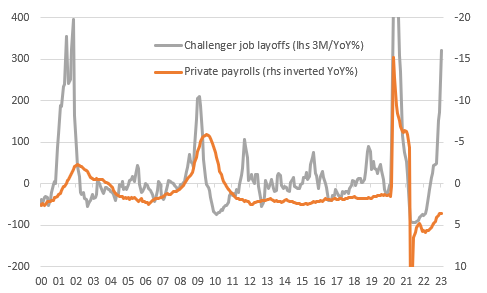US jobs surge catches everyone off-guard
The US added more than half a million jobs in January, way above what anyone expected given the softening economic newsflow and rising job lay-off announcements. Great news that ensures another 25bp hike in March, but we have to be wary of extrapolating from this one data point
| 517,000 |
Number of jobs the US economy added in January |
Jobs surge with little sign of any weakness
So US non-farm payrolls rose 517,000 in January versus the 188,000 consensus and way above any of the forecasts that were out there. There were also 19,000 of upward revisions to the past couple of months of data. Meanwhile the unemployment rate dropped to 3.4% from 3.5% (consensus 3.6%) with the household survey reporting an 894,000 increase in employment and a 28,000 drop in the number of people classifying themselves as unemployed. Average hourly earnings rose 0.3% month-on-month as expected. So despite this fantastic job creation story, employers are easily able to pick up new workers without needing to pay-up, which is surprising given how tight the jobs market is.
The details show goods producing employment rose 46,000 with services adding 397,000 leaving private payrolls up 443,000. The government sector then added a huge 74,000 jobs. Pretty much every component rose with health & social assistance (+105k) and leisure and hospitality looking (+128k) particularly strong.
It's difficult to rationalise given the economic data
A real surprise, which is difficult to explain. We have to just take that on the chin and say despite seven consecutive monthly falls in residential construction output, three consecutive falls in industrial production and consumer spending disappointing in November and December firms are still happy to hire. Maybe the Fed will keep hiking for longer, but we will need to see the economy suddenly rebound to make this great job news continue.
Surging lay-offs suggest employment will weaken

We have to be a little sceptical though given that confidence in America’s board rooms and the small business sector (Conference board survey of CEOs and the NFIB small business optimism index) are below the levels seen at the worst point in the pandemic. This would hint at a more defensive mindset that focuses more on cost reduction rather than business expansion. That is certainly the story from the Challenger job lay-offs series in the chart above. We are not looking another 500,000+ figure next month…
This publication has been prepared by ING solely for information purposes irrespective of a particular user's means, financial situation or investment objectives. The information does not constitute investment recommendation, and nor is it investment, legal or tax advice or an offer or solicitation to purchase or sell any financial instrument. Read more
Download
Download article